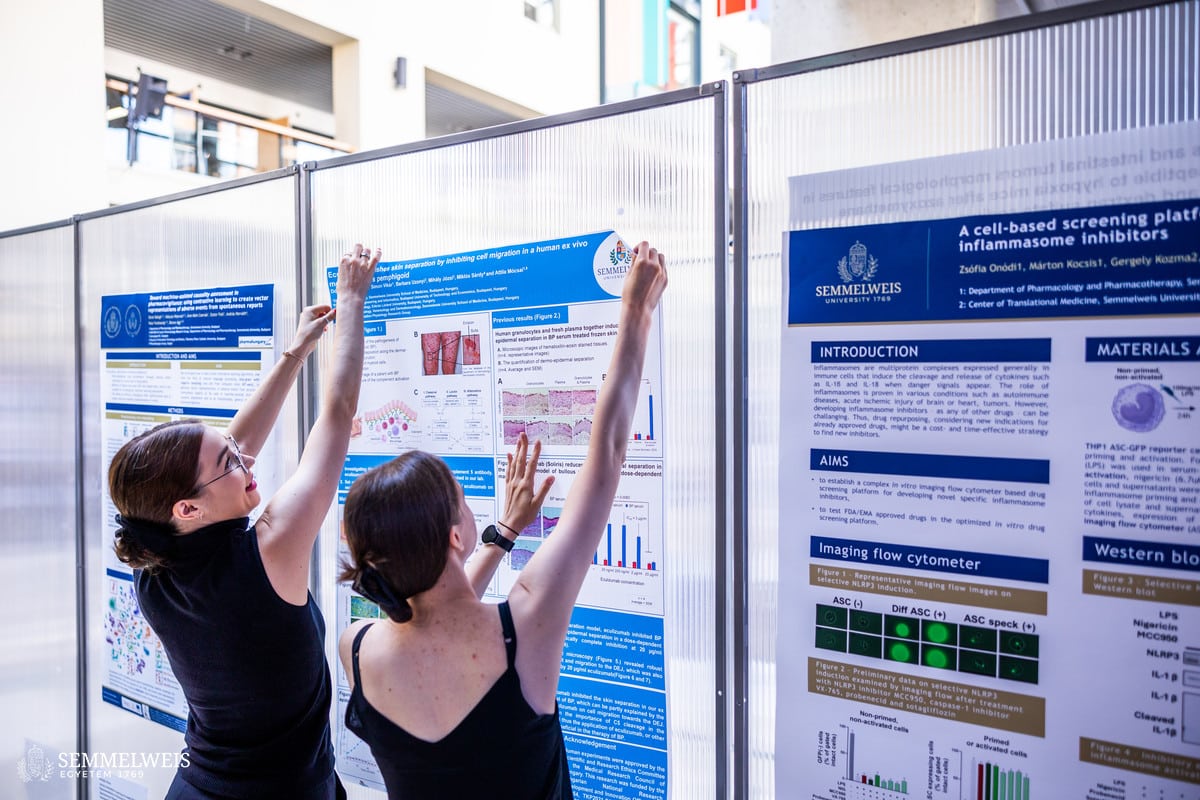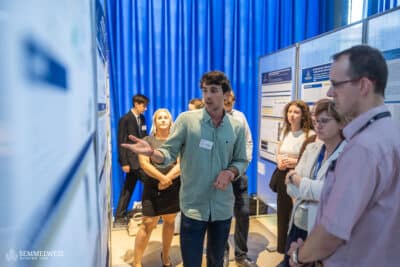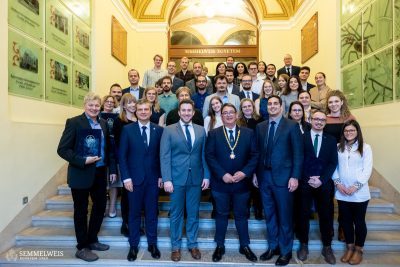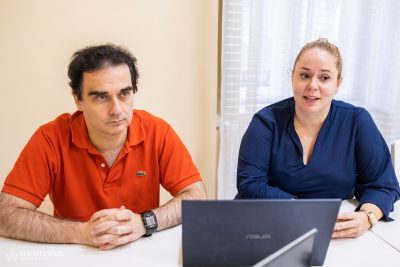“Over the past year, we have made progress in many areas and put the Doctoral Students’ Union on a good track, so that I was able to hand over its leadership with peace of mind,” said Dr. Péter Vámosi, who had been president since September 2024, in addition to holding several other positions, including president of the Hungarian Residents’ Association and vice president of the Association of Hungarian PhD and DLA Candidates. Following his resignation from the presidency, the 16-member Assembly of Representatives elected Dr. Patrik Krisztián Kreuter, former Deputy President, PhD student, and resident at the Department of Pediatric Dentistry and Orthodontics, as President.
Dr. Patrik Krisztián Kreuter: We will further invigorate DÖK
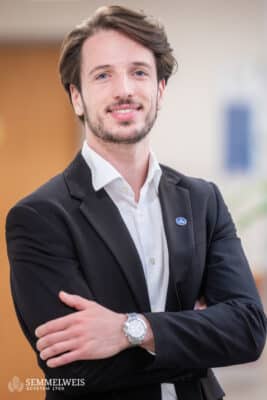 “I consider it one of the most important tasks for the coming period to make communication with doctoral students, who form a fairly heterogeneous group in terms of age, career path, as well as nationality, more direct and lively,” said new President Dr. Patrik Krisztián Kreuter, who is also President of the Medical and Health Sciences Section of DOSZ, to our website. “We plan to provide up-to-date information on studies, regulations, and applications, strengthen student services, and make community life more vibrant,” he added.
“I consider it one of the most important tasks for the coming period to make communication with doctoral students, who form a fairly heterogeneous group in terms of age, career path, as well as nationality, more direct and lively,” said new President Dr. Patrik Krisztián Kreuter, who is also President of the Medical and Health Sciences Section of DOSZ, to our website. “We plan to provide up-to-date information on studies, regulations, and applications, strengthen student services, and make community life more vibrant,” he added.
Among his ideas, he mentioned that in order to ensure the quality of PhD programs at the university level in the long term, they would create a reporting system for channeling student feedback and comments, through which opinions could be formed anonymously. In addition to strengthening the advisory services that support the orientation of new PhD students, he would like to help the approximately 1,200 doctoral students in completing their studies effectively and consciously by organizing events, various training courses, and workshops. He plans to launch these occasions as early as the beginning of next year. One of the first such events will be “Speaking like a doctor. What makes medical communication effective?”, which will feature speakers from the fields of linguistics and medicine discussing the techniques that can be used in doctor-patient communication. Among the most important tasks, he mentioned reaching out to the growing number of international PhD students and involving them in the life of DÖK even better.
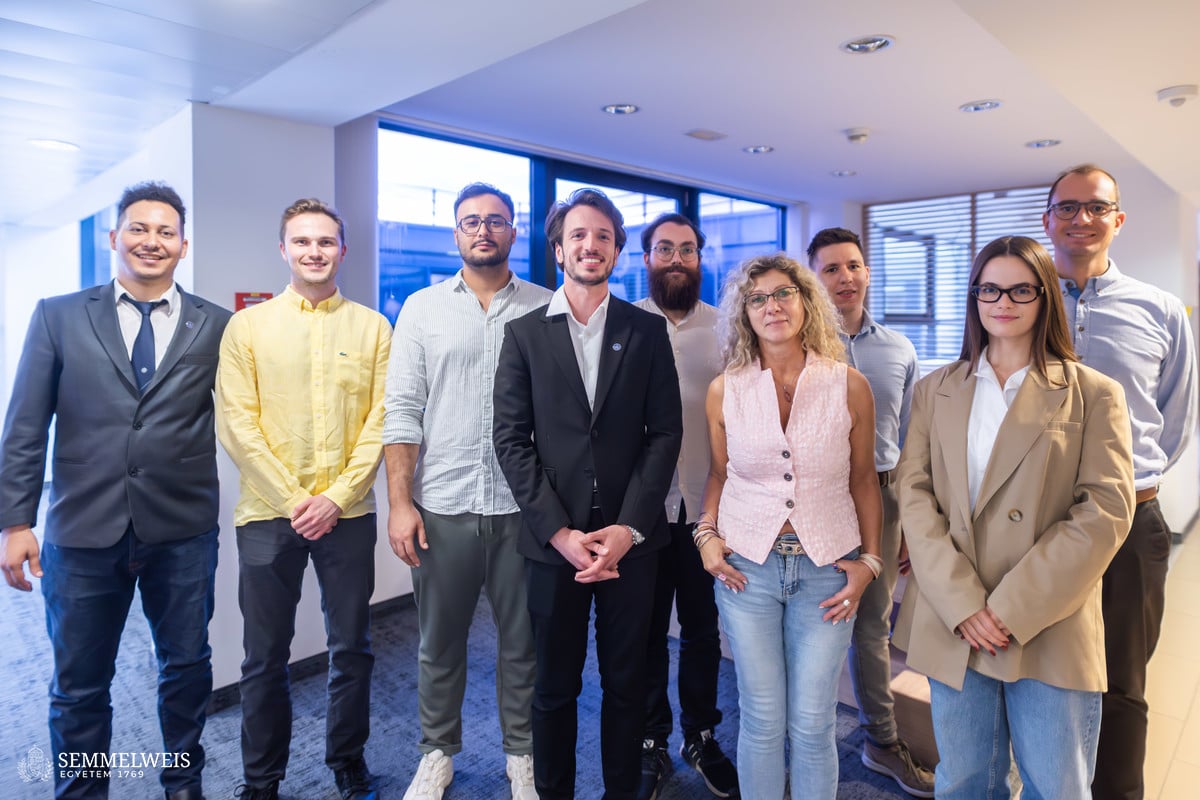
In addition, we would like to celebrate the 33rd anniversary of DÖK in a fitting manner next year, said Dr. Patrik Krisztián Kreuter. He emphasized that since the Semmelweis Doctoral Students’ Union was the oldest doctoral student representative body in Hungary, they would like to continue to operate it at a high level as well as develop it, and they would also like to play a decisive role in university and national PhD representation and decision-making, as before. He hopes that this will be successfully achieved with a renewed organization as a result of the upcoming DÖK Assembly of Representatives elections in the coming months.
Dr. Patrik Krisztián Kreuter, who has been Deputy President of DÖK for the past two years, will continue to teach practical orthodontics courses in English and Hungarian, as well as elective courses at the Department of Pediatric Dentistry and Orthodontics, and will participate in Harvard Medical School’s Clinical Science Scholars Program at Semmelweis University alongside pursuing his PhD studies.
Dr. Péter Vámosi: The past period has brought many positive changes for doctoral students
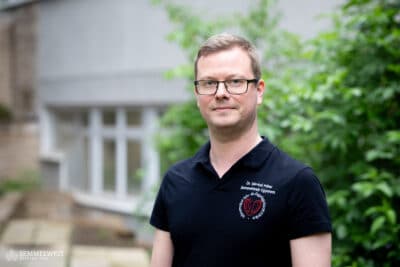 “During my time as head of DÖK, I was guided by the same service-oriented, supportive approach that I adopt in my other university roles,” said former President Dr. Péter Vámosi, assessing the past period. As he explained, during his presidency he was able to actively participate in negotiations on several projects that are important to doctoral students and that have brought about changes beneficial to young researchers. Among these, he mentioned that Semmelweis University was the first in the country to retroactively implement, with effect from 2024, the government-level decision long urged by the Association of Hungarian PhD and DLA Candidates to count the doctoral period towards eligibility for pension. “Another very important achievement is that those who are part-time residents in addition to their PhD studies receive a higher scholarship,” he emphasized.
“During my time as head of DÖK, I was guided by the same service-oriented, supportive approach that I adopt in my other university roles,” said former President Dr. Péter Vámosi, assessing the past period. As he explained, during his presidency he was able to actively participate in negotiations on several projects that are important to doctoral students and that have brought about changes beneficial to young researchers. Among these, he mentioned that Semmelweis University was the first in the country to retroactively implement, with effect from 2024, the government-level decision long urged by the Association of Hungarian PhD and DLA Candidates to count the doctoral period towards eligibility for pension. “Another very important achievement is that those who are part-time residents in addition to their PhD studies receive a higher scholarship,” he emphasized.
Dr. Péter Vámosi recalled that Semmelweis University had recently renewed its entire Doctoral Regulations, which were approved by the Senate at the end of August, following several months of consultation involving DÖK. The amendments promote greater appreciation for PhD students, he pointed out. Part of this is the significant step of awarding the full amount of the four-year scholarship at the same time as the degree even to those who are able to complete their studies earlier than the specified time frame. Another important result responding to a long-standing demand, and one which will affect all degree holders, is that the dissertation defense process has been shortened by approximately two months. In addition, several amendments have been made to the regulations to strengthen legal security and predictability, creating a more motivating environment for PhD students. The former president included among these the assurance of transferability from fee-paying (self-financed) to state-funded status, as well as the expansion of deferral benefits for doctoral students with children. (We reported on further amendments affecting doctoral training and the relevant legislative changes effective from June in our previous article.)
Among the highlights of the past year, he noted especially that in June this year, Semmelweis University hosted Hungary’s largest event for doctoral students, the two-day Spring Wind Conference 2025.
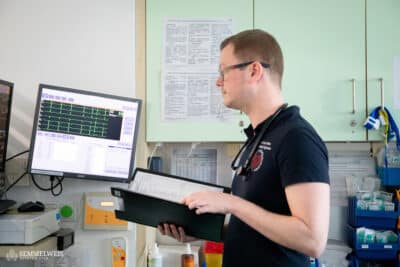 Dr. Péter Vámosi completed his residency training last year and is currently assistant lecturer and consultant cardiologist at the Városmajor Heart and Vascular Center. His PhD dissertation is also linked to the center, as it focuses on the artificial intelligence-based prediction of the progression and recurrence of various cardiological diseases using digital ECG. This is based on the recent introduction of a digital ECG system at the center, in which he played a leading role as project manager. “In addition to research, digitization also serves education and patient safety, as the current ECG can be compared with previous recordings,” he pointed out. Next to patient care and PhD research, Dr. Péter Vámosi continues his teaching activities; he teaches paramedics and nursing students at the Faculty of Health Sciences (ETK) how to use and analyze ECGs in clinical practice, and he also teaches cardiology to fourth-year medical students in Hungarian, English, and German.
Dr. Péter Vámosi completed his residency training last year and is currently assistant lecturer and consultant cardiologist at the Városmajor Heart and Vascular Center. His PhD dissertation is also linked to the center, as it focuses on the artificial intelligence-based prediction of the progression and recurrence of various cardiological diseases using digital ECG. This is based on the recent introduction of a digital ECG system at the center, in which he played a leading role as project manager. “In addition to research, digitization also serves education and patient safety, as the current ECG can be compared with previous recordings,” he pointed out. Next to patient care and PhD research, Dr. Péter Vámosi continues his teaching activities; he teaches paramedics and nursing students at the Faculty of Health Sciences (ETK) how to use and analyze ECGs in clinical practice, and he also teaches cardiology to fourth-year medical students in Hungarian, English, and German.
The new leadership of the Semmelweis Doctoral Students’ Union
President: Dr. Patrik Krisztián Kreuter
Deputy President: Dr. Dániel Borbola
Vice Presidents: Dr. Adél Mózes, Dr. Yahya Kamel, Dr. Máté Tolvaj
Presidential Representatives: Dr. Péter Vámosi, Dr. Félix Takács, Dr. Gábor Orbán
Pálma Dobozi, Melinda Katalin Kiss
Translation: Dr. Balázs Csizmadia
Photos by Bálint Barta, Boglárka Zellei – Semmelweis University
